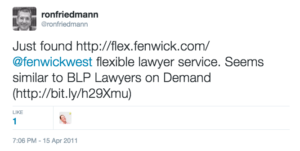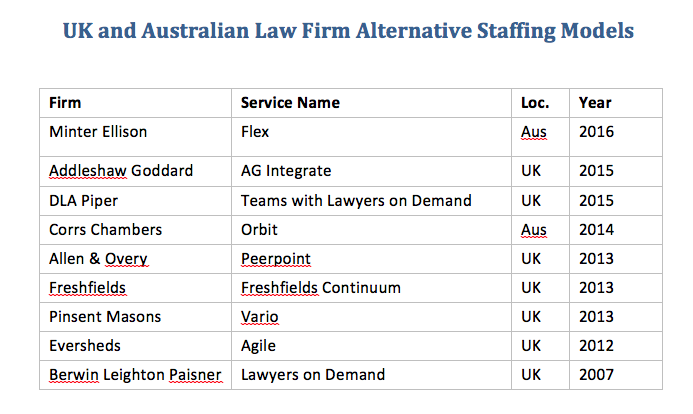FLEX by Fenwick is Fenwick & West LPP‘s 90-lawyer-strong interim in-house counsel business that “is the only service backed by an AmLaw 100 firm that provides custom solutions for interim in-house legal needs.” I have long followed alternative lawyer staffing models so was pleased to learn more about FLEX from Carole Coplan, its General Manager.
Background: The Rise of High-End Secondment and Interim In-House Counsel Services for Law Departments
Before reporting on FLEX, some background is helpful. Since the 2008-10 economic crisis, clients have demanded more value from law firms. They have moved work from firms to alternatives such as legal process outsourcers (LPO), legal tech providers, lawyer staffing services, high-end lawyer secondments, and interim in-house counsel. Staffing means short-term, relatively undifferentiated lawyers; secondment and high-end interim in-house counsel mean experienced and specialized lawyers whom clients typically retain for high-value legal services and longer time periods.
Axiom Law has the biggest share of mind in the secondment and interim in-house counsel market. Started around 2001, it grew rapidly in 2009 and beyond when GCs sought to reduce costs. It has many competitors including, in the UK and Australia, some law firms:
I have long wondered why more US law firms have not developed such services. I had moment of excitement in 2011 when I first learned about Fenwick & West LLP’s FLEX service in 2011 (see Tweet image)

but was surprised that no firms followed. My next surprise was when I recently read (Thomson Reuters blog) that FLEX had grown to 90 lawyers, I knew the time had come to learn more. And that’s when I reached out to FLEX and was introduced to Carole…
What FLEX Does
FLEX provides in-house attorney solutions for high-growth companies. Most clients utilize FLEX for its bench of commercial transactions attorneys, though many engagements are for support for M&A, employment law, litigation or regulatory work (e.g., privacy). FLEX attorneys have both law firm and in-house experience with at least 5-6 years of experience in one subject area to former public and private company GC’s with 20-25 or more years of experience. All are highly vetted with strong credentials and are interviewed and tested to make sure they have the experience and advising skills necessary for in-house work. FLEX offers companies a variety of plans including quarterly blocks of 60, 90, or 120 hours; part-time lawyers for 2 to 4 days per week; and full-time for a negotiated time period. The internal FLEX team includes seven full-time staff. Carole is a former GC and the team’s three client managers, recruiting manager and head of marketing are also lawyers.
FLEX Fit with Fenwick
Fenwick started FLEX for strategic reasons, not simply to generate revenue. Management saw that clients and prospects had legal needs that Fenwick’s full-service core offering could not always meet at the right price point. Fenwick started FLEX when it saw that venture-backed clients needed an in-house attorney to handle commercial transactions and other routine legal needs once the client reached a certain point in its growth cycle. With service at a different value point, FLEX can start a relationship where one does not exist or deepen an existing one. The firm has extensive experience with early stage companies and so has a strong sense of what type of lawyering and lawyering economics clients need at different stages of growth and financing. Today, FLEX’s clients include venture-backed private companies, as well as large publicly traded companies.
How FLEX Works
FLEX lawyers are W-2 employees of Fenwick but are a different bench of attorneys than Fenwick. They are deployed with clients as consultants and at a much lower cost structure. They are covered by the firm’s malpractice insurance and they receive PTO benefits, as well as insurance benefits if they work a minimum of 20 hours/week, which some do. FLEX does not guarantee its lawyers work nor are they paid if they do not work. They are free to work for competitors such as Axiom or Paragon. The lawyers are not required to make a minimum commitment. Some do not want to work anywhere close to the 20-hour threshold for benefits but others do work full time.
FLEX clients and attorneys must clear the firm’s usual conflict checking process. But a FLEX lawyers’ duty of confidentiality runs directly to the client, not to the firm. Their email is in the flexbyfenwick.com domain and they have only limited access to the firm’s knowledge management (KM) resources (e.g., a database of form contracts). They are backed by the Fenwick brand and resources, however, and they can ask Fenwick partners quick legal questions. Partners do not bill for short answers; if more is required, a matter needs to be opened. FLEX maintains a database of templates for its attorneys and they have access to PLI and other resources.
Carole reports that FLEX seeks to offer its lawyers stable, predictable, and high value engagements. This is not as easy as it may sound because operationally, balancing the bench is a challenge. That is, FLEX needs enough lawyers on its roster to meet demand yet also wants to provide each with work (even though it is not contractually required to so).
Most of FLEX’s clients are Fenwick clients, however, some of FLEX’s clients don’t otherwise work with Fenwick. Fenwick has also been a customer of FLEX but this is not a primary purpose of FLEX nor a big driver of its business.
Though FLEX is not a recruitment agency, it does assist its lawyers who want to go in-house and its clients seeking permanent in-house lawyers. When a lawyer does convert to full-time, FLEX charges a conversion fee. This is not a goal or business driver but part of the strategy of focusing on meeting client requirements.
Why FLEX is the Only Model of Its Kind in the U.S.
I asked a Carole one of my long-standing questions: why does the US have only one Big Law staffing business and the UK multiple ones? She offered three tentative reasons, agreeing the answer is not obvious. Her hypotheses in italics followed by my commentary:
- Law firms are not entrepreneurial. Trite but it’s true – not much else to discuss on this one.
- Partners worry about tarnishing their brand with routine / commodity work. We both question this assumption, viewing it through an empirical lens with limited data. The perception, however, likely is mainly wrong: FLEX lawyers are highly skilled and experienced though they may do a bit more routine work than associates or partners. And even if it were true, so what? In both B2B and B2C, customers recognize that providers offer services at different levels. This typically makes a provider more rather than less attractive.
- Partners fear the staffing model will cannibalize their core business. We laughed that the same partners who fear commodity perception simultaneously believe this, since the two stand in contradiction. That aside, we agreed that while such service might substitute for a small percent of a firm’s work, if clients want this type of service, they will buy it. If a firm does not provide it, they will go elsewhere.
All this said, we still cannot explain why the UK market is so different. Comments, especially from the UK, welcome.
Conclusion
In response to client pressure for value, smart firms improve service delivery in multiple ways: scoping, budgets, project management, KM, practice technologies, and alternative staffing. FLEX is a great example of how Big Law is adapting to new normal by adopting what many now call a NewLaw approach. As FLEX continues to grow, the question is if (when?) US firms will follow.

Archives
Blog Categories
- Alternative Legal Provider (44)
- Artificial Intelligence (AI) (57)
- Bar Regulation (13)
- Best Practices (39)
- Big Data and Data Science (14)
- Blockchain (10)
- Bloomberg Biz of Law Summit – Live (6)
- Business Intelligence (21)
- Contract Management (21)
- Cool Legal Conferences (13)
- COVID-19 (11)
- Design (5)
- Do Less Law (40)
- eDiscovery and Litigation Support (165)
- Experience Management (12)
- Extranets (11)
- General (194)
- Innovation and Change Management (188)
- Interesting Technology (105)
- Knowledge Management (229)
- Law Department Management (20)
- Law Departments / Client Service (120)
- Law Factory v. Bet the Farm (30)
- Law Firm Service Delivery (128)
- Law Firm Staffing (27)
- Law Libraries (6)
- Legal market survey featured (6)
- Legal Process Improvement (27)
- Legal Project Management (26)
- Legal Secretaries – Their Future (17)
- Legal Tech Start-Ups (18)
- Litigation Finance (5)
- Low Cost Law Firm Centers (22)
- Management and Technology (179)
- Notices re this Blog (10)
- Online Legal Services (64)
- Outsourcing (141)
- Personal Productivity (40)
- Roundup (58)
- Structure of Legal Business (2)
- Supplier News (13)
- Visual Intelligence (14)

